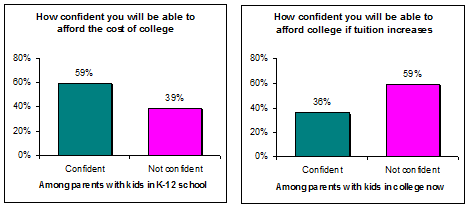By Pilar Marrero/ [email protected] |2011-08-18
LOS ANGELES, Calif.- When it comes to their children’s education, Latino voters have clear and high aspirations: a new poll revealed that an overwhelming 96%—almost all—would like to see their kids earn a college degree, whether it is a bachelor’s, master’s or professional degree. What is not so clear is whether these voters can achieve this, at least from the financial point of view, since 59% do not think they will be able to continue paying their children’s tuition if it increases again next year. And 40% thinks that in general, even today, it will be difficult to pay all the costs associated with having their children attend college. These are some of the results of an impreMedia/Latino Decisions poll, the fourth in a series of six national polls exploring the opinions of the Latino group that has best integrated into American society: registered voters. This particular poll focused on the education issue.

“These results confirm that the stereotype many have about Latinos in this country, that they push their children to look for a job instead of studying, is nothing but a stereotype,” said Adrián Pantoja, an associate professor of political science at Pitzer College. “What happens is that aspirations are one thing and another are economic realities that at times prevent these dreams from coming true. This population is aware of the limitations.”
An interesting poll finding is that, when it comes to seeking solutions for problems related to education and the low high school graduation rate, Latino voters are not so attached to ideological solutions (read: liberal or conservative) and freely choose from both options, sometimes in contradictory ways. For example, the poll revealed Latinos consider the participation of parents the most important or crucial issue in tackling education problems. Only 17% blamed the state, 10% the school district and 5% teachers. In fact, Latinos usually have a high opinion of their children’s schools and teachers. Of respondents, 73% think their children’s teachers are good or excellent, while 67% think the school their children attend is good or excellent.
Also, 74% oppose reducing teachers’ salaries. However, 53% support the idea—generally considered conservative—of basing salaries on performance rather than seniority, an option supported by 37%. They also support the idea of rewarding school performance and encouraging schools to compete against each other, something consistent up to a point with educational reforms proposed by both George W. Bush and Barack Obama. “Latinos respect teachers, want to pay them more and, although they’re not conservative per se, are open to a variety of solutions,” said Gary Segura, a poll advisor and Stanford University professor.
Regarding solutions to education problems, voters support different things. The use of tax credits to pay for private school or college tuition obtained the support of 51% (school) and 84% (college) of voters. Nevertheless, history has shown that, when push comes to shove, a high percentage of Latino voters reject vouchers. For example, in 2000 there were two renowned state initiatives involving vouchers (which are essentially publicly funded coupons given to parents to invest in their children’s education at a private institution, an idea the Republicans have pursued for years). These initiatives, in California and Michigan, were defeated and rejected, especially by African-American and Latino voters. But the persistent attraction of this type of solution means that Latinos are open to possible non-conventional solutions to education problems. Latinos are political entities who are hard to categorize within the political or ideological options in the United States, according to Robert R. Preuhs, a political scientist at the Metropolitan State College of Denver. “When you ask Latinos whether they’re liberal, moderate or conservative, more of them say they don’t know than what we see in other groups. And it’s not because they don’t know what it means, but rather because they have mixed ideas about things… Latinos are fiscally liberal and vote for the Democratic Party; however, on some issues, they answer like conservatives,” said Preuhs.
The poll also shows overwhelming support for facilitating education for undocumented students (76%) and bilingual education (80%), and opposition to reducing the school calendar (84%) and reducing art and music classes (65%). These voters are willing to pay more taxes for bond measures or to collect money and invest it in education (63%), all of which are the most liberal options within the political spectrum.
Education continues being an issue of the utmost importance for Latinos in the U.S.—although in recent months, other issues such as the economy and immigration have had more of a presence in the public arena and have demonstrated a higher priority in recent polls of Latinos in the United States. In these types of polls, it was traditional for education to be the number one issue for these voters, but in this particular poll, education came third after the economy/jobs and immigration. This makes sense especially today, when the educational opportunities for young people are connected to their immigration status and the swings of the economy.
The economic situation has led states and school districts to make cuts in school spending and increase tuition in colleges and universities frequently in the last few years. This severely impacts the aspirations of Latinos, since a majority of their children count on public education in order to progress, according to the experts.
Note: Full results of the August 2011 impreMedia-Latino Decisions tracking poll will be released on Monday August 22, with a focus on Latino attitudes towards schools and education policy, and education reform.


